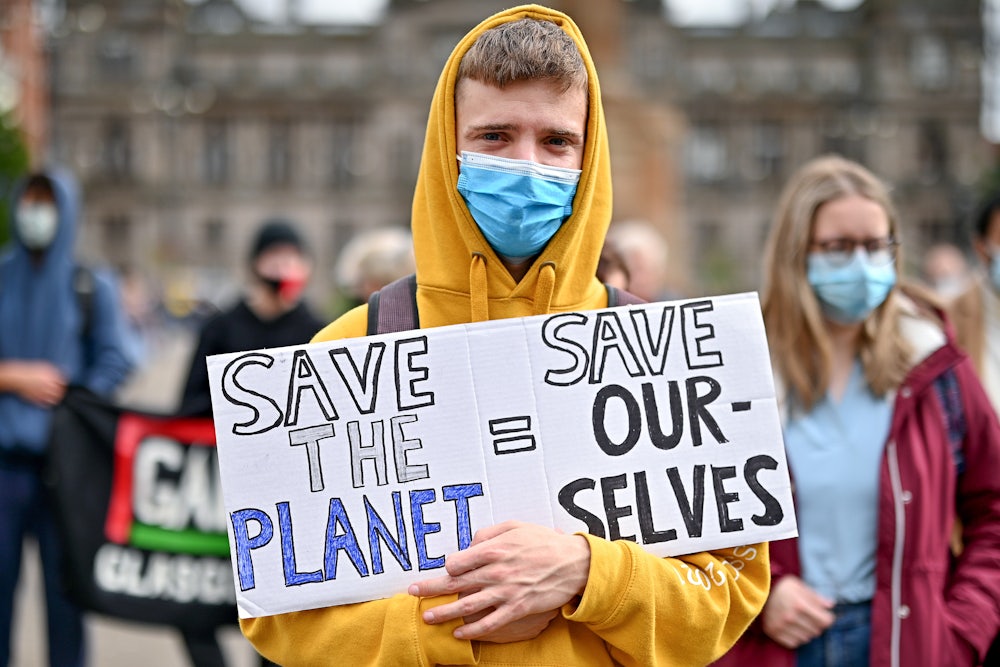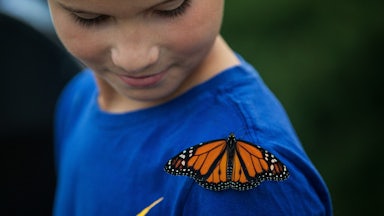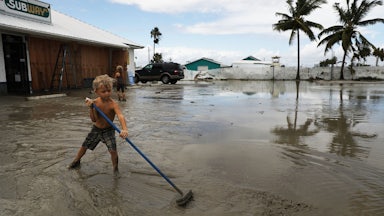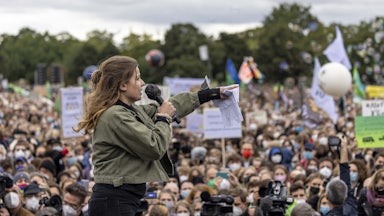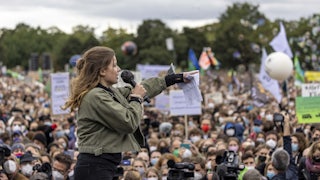From the Vietnam War to transphobia, generational conflict over political and social issues has long been a source of holiday anguish for families. This year, however, climate change could make yuletide comity especially challenging. Many young people are arriving at festive dinners feeling angry and betrayed about their elders’ denial, lack of action, and perhaps dearth of care. Still, as panicked as the climate-conscious may feel after the COP26 Climate Summit in Glasgow, and amid the uncertainty of the Senate’s decision on Build Back Better and its associated climate spending, organizers and therapists alike agree that being jerks to our families probably won’t help.
It’s conventional to admonish one another to “avoid politics” at family get-togethers, but environmental issues can be harder to avoid than bickering over which uncle supports which politician. They’re raised by the very holiday rituals themselves—including decorations, packaging on gifts, and most of all—because it’s most central to our sense of family togetherness or festivity—food. Wendy Greenspun, a psychotherapist in New York City, notes that one of her young clients was upset by her family’s use of plasticware at large gatherings. Veekas Ashoka, 30, an activist with the Sunrise Movement, a youth climate group, admits that his relatives get defensive about his veganism. “What I’ve found is that a wall starts to form,” he explains, “that’s invisible until these topics explicitly come up, where folks around me feel a sense of shame or guilt I never meant to put on anyone.”
Ashoka says he’s found that a more systemic discussion of the climate change movement’s goals can diffuse such tensions. When he talks with his family about his Sunrise activism, Ashoka says, “I say, very repetitively, that what we believe, and what I believe, is that individual lifestyle stuff is secondary at best to collective action to create systemic change. Once we can pass the Green New Deal, it will be easier to not drive a gas-guzzling car to work. It will be easier to eat food that doesn’t harm the planet.”
Another Sunrise activist, Paola Sanchez, 27, who sees her immediate family often, says she doesn’t need to persuade them on the rightness of her cause, but given how hard climate organizing can be, “what I really seek from my family is a baseline understanding of the emotional weight of this work.” For Sanchez, talking with them about some of the hardest, most personal dimensions of the crisis has helped. Her mother “very much” wants grandchildren, Sanchez says. So Sanchez explained to her mother that this is one of the reasons she organizes on behalf of the planet—“so I can feel good about putting people here, to live beyond my years. That perspective has really shaped how my parents show up for me.” That approach, she said, “shows them how large this crisis is,” and helps her to get what she needs: “the hugs, the packed extra food for busy or tired days when I’m not able to do that for myself.”
If you do want to persuade your family on the climate, says longtime organizer Jane McAlevey, author of No Shortcuts: Organizing for Power in the New Gilded Age, prepare ahead of time. As with any organizing conversation, identify your objective. (If it’s just to vent, harangue them, or make them feel bad, it’s probably better to stick to talking about college football.) Do you want them to vote for a more climate-friendly politician? Donate to an organization? Join you at a protest? Then strategize about what might persuade them. What’s important to your family? Appeal to what you have in common. McAlevey suggests exploratory comments like, “I’m worried about the future of this family,” or, “What did you enjoy most growing up? I’m worried our kids won’t be able to play outside like that.” Listen more than you talk, she says, and allow their concerns to guide the conversation.
The therapists interviewed for this article also stressed listening. Greenspun said, in a disagreement on a matter this serious, “try to move away from the polarization” and instead present a mixture of positions: “I’m upset but also understand where you’re coming from.” For the person extremely anxious about the climate crisis, that might entail hearing, and saying out loud, why their interlocutor feels irritated or attacked by their concern (“you feel like I’m criticizing your lifestyle, which you’ve worked so hard to achieve”); the less worried party might then feel more understood, and more inclined to return the empathy.
For those most immersed in the climate fight, it’s also important to know when to let it go. Grace Cuddihy, 17, is a Sunrise activist who lives at home with her conservative parents (her father is a Trump supporter). She says she used to feel the “burden” of trying to change their minds. An enthusiastic phone-banker, she recalls, “I would spend all this time convincing people on the phone, and then I would get into these personal conversations with my family members and I would feel this pressure that I had to convince them, too.” After all, she reasoned, it’s a crisis. As well, she was mad at them. “I used to spend a lot of time being really angry at my dad for having these views,” she recalls, “and for not stepping up to be the dad I wanted him to be. It wasn’t good for my mental health or his mental health.” With her extended family, too, politics “became something that was emotionally taxing and draining for all of us around the holiday dinner table.”
Recently, Cuddihy has eased up on them—and on herself. “I had to draw that boundary for myself, that I wasn’t going to do that with my family.” They don’t view her as a “real authority” on the subject, anyway, but rather “an idealistic, blue-haired liberal.” Stepping back from this role in her family has improved her relationship with them, as well as her experience of holidays. “The holidays are supposed to be rejuvenating and relaxing, and that was not the experience I was having of the holidays. As an activist, I really believe, stay with your values, your moral compass. But sometimes I have to put my values to the side just to get through the day.”
But for those whose families are more hospitable to this topic, Ashoka underscores the importance of “approaching these conversations remembering that these are people I love, and just kind of remembering that in the whole conversation.” Indeed, love can also be politically transformative: Remember how many people changed their minds about gay marriage because someone in their family came out to them? The realization that climate change affects their grandchildren’s futures is driving some senior citizens into the streets (that’s why climate activist and author Bill McKibben has started an organization, Third Act, to organize them). Maybe climate change can be the gay marriage of the 2021 holiday season.
